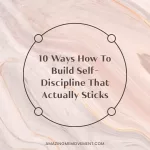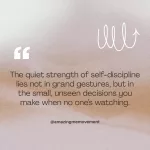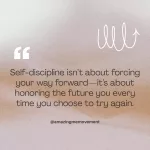Let’s be honest, building self-discipline isn’t easy. We’ve all made promises to ourselves we didn’t keep. Maybe you told yourself this would be the year you’d wake up earlier, eat healthier, or finally write that book… and yet, here you are again. But here’s the truth: failing in the past doesn’t mean you’re incapable. It just means you haven’t found a system that works for you yet. And that’s what this blog is all about. In this guide, you’ll learn how to build self-discipline from the ground up, even if you’ve struggled repeatedly.

We’ll unpack the psychology behind willpower, debunk common myths, and walk you through practical, sustainable steps you can apply right away. Whether your goal is personal growth, career success, or simply feeling more in control, this article offers real solutions for real people.
What Is Self-Discipline, Really?

Self-discipline isn’t about being perfect. It’s about staying committed even when you don’t feel like it. At its core, self-discipline is the quiet strength that helps you act in alignment with your values—even when you’re tired, overwhelmed, or discouraged. It’s the decision to keep showing up, even when no one is watching. That’s where your power lies.
The Difference Between Motivation and Discipline
Motivation is wonderful, but it’s fleeting. It’s that burst of energy you get after watching an inspiring video or hearing a powerful story. But that energy doesn’t last. Discipline, on the other hand, is steady and reliable. It’s the decision you make in the quiet moments; the ones where giving up would be easier, but showing up is what builds your future.
Why Most People Fail
Most people don’t fail because they’re lazy or unmotivated. They fail because they aim too high too fast, try to overhaul everything overnight, or expect perfection at every step. When the first stumble comes—and it always does—they take it as proof they’ll never change. But setbacks aren’t the enemy. The real enemy is thinking you have to be flawless to be disciplined. You don’t. You just have to keep going. Once you learn how to build self-discipline in a sustainable way, you’ll realize how possible real change can be.
10 Ways to Overcome Procrastination and Get Things Done
10 Ways On How to Build Self-Discipline That Lasts

Start With Self-Awareness
Before you can change any behavior, you have to understand it. Take a few quiet moments each day to reflect on what’s really holding you back. Are you overwhelmed? Distracted? Afraid of failure? Start paying attention to your patterns, not with judgment, but with curiosity. This gentle self-inquiry is the foundation of real, lasting change.
Define a Clear, Personal Why
When your goals are tied to something deeply personal, they become much easier to follow through on. Don’t just say you want to wake up early, ask yourself why it matters. Maybe it gives you time for yourself before the chaos begins. Maybe it’s the only time you feel truly in control. When you connect with that deeper purpose, discipline becomes less of a burden and more of a gift to yourself.
Set Small, Achievable Goals
Big goals can be inspiring—but they can also be paralyzing. The secret is to start small. Tiny wins, like walking around the block instead of running five miles, or journaling for five minutes instead of writing a novel, build trust in yourself. Over time, these tiny acts accumulate into something powerful. They remind you that you’re capable—and that’s where momentum is born. If you’re wondering how to build self-discipline without feeling overwhelmed, this is where it starts.
20 Quotes On Self Respect To Remind You Of Your Worth
Build Identity-Based Habits
Behavioral change expert James Clear reminds us that true transformation happens when we stop trying to change outcomes and start changing identities. Don’t just aim to write every day, see yourself as a writer. Don’t just try to eat healthy—be someone who takes care of their body. When you act in alignment with who you want to become, discipline feels natural.
Use Triggers and Routines
Discipline isn’t about willpower alone, it’s also about structure. Simple routines and environmental cues can do wonders. Set out your workout clothes the night before. Create a peaceful space for your morning routine. Associate new habits with something you already do, like meditating right after brushing your teeth. These gentle prompts help train your brain to follow through without friction.
Track Progress, But Don’t Obsess
Monitoring your growth can be incredibly motivating, but only if you keep it kind and realistic. Instead of chasing perfection, look for consistency. Maybe you skipped a workout, but did you bounce back the next day? That’s progress. Maybe you missed a journaling session, but you came back to it. That’s resilience. Focus on showing up, not showing off.
How To Change Your Life in 21 Days or Less
Expect Setbacks and Plan for Them
You will mess up. That’s not a flaw in the system—that’s the system working. Discipline is not about being perfect; it’s about recovering with grace. The faster you forgive yourself and get back on track, the stronger your discipline becomes. Anticipate the hard days, the tired days, the emotional days. And have a gentle plan to support yourself through them.
Surround Yourself With Accountability
Change is easier when you don’t do it alone. Whether it’s a supportive friend, a coach, or an online community, having someone to check in with makes all the difference. Not just to stay on track, but to remind you that your efforts are seen and celebrated. Accountability isn’t about pressure, it’s about connection.
How To Keep Focus On Your Goals In An Ever-Changing World
Reward Yourself Intentionally
Celebrating your wins is part of the process. Not as a bribe, but as a way of reinforcing the fact that you’re worth showing up for. When you reach a milestone, pause. Acknowledge it. Feel proud of the discipline it took to get there. These small moments of celebration create emotional memory, and that keeps you going.
Repeat, Refine, Recommit
Self-discipline isn’t built in a day, it’s built every day. As you go, you’ll learn what works, what doesn’t, and what needs adjusting. Be flexible. Be forgiving. And most importantly, be persistent. Discipline isn’t about intensity, it’s about consistency.
You’re Not Broken, You Just Need A Better Framework
If you’ve failed before, it doesn’t mean you’re not capable. It means you were doing the best you could with the tools you had. Now, you have better tools. And more importantly, you have a deeper understanding of yourself. Learning how to build self-discipline isn’t about punishing yourself into change—it’s about guiding yourself toward the life you truly want to live.
Start small. Be kind. Keep going. You’ve got this!
Building Self-Discipline: Powerful Tips To Apply In Your Journey
21-Day Self-Improvement Challenge: A Step-by-Step Guide
7 Powerful Shifts To Change Your Mindset
How To Stop Self-Sabotage And Step Into Your Power











Leave a Reply